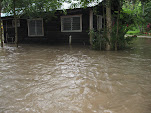There is a roundtable discussion happening over at Julie's which simply asks which is of greater necessity, justice or forgiveness.
Try as I might, I am unable to discern a qualitative difference in value that might construe degrees of necessity.
I perceive justice as a social, political, & legal conceptual framework (a by-product of, and an important ingredient in, the perpetration & perpetuation of the illusory battle between the forces of good & evil) that is forever relative to context, culture, world view, and history. Justice, in juxtaposition to fairness, appears extremely difficult to measure, and its distribution oftentimes appears arbitrary. An eye-for-an-eye sounds easy enough, but a particular crime might warrant a 5 year probation where I live & a 20 year prison sentence elsewhere. So which penalty is more just (and should measures of justice be adjusted when prisons are under/over-crowded)? In this legal sense, justice oftentimes feels like state-sponsored revenge, subject to availability and/or fiscal opportunity; and while no two courts can agree on how much revenge is sufficient, victims & their families tend to agree that neither the amount nor the nature of the revenge is ever sufficient.
Readers of Plato's Crito know that Socrates would crush any one concept of justice within three minutes and ask three questions, the last answer to which would directly contradict whatever definition of (and justification for) justice was originally proposed. Justice is like a butterfly - the harder you pursue it the better it evades you.
I perceive forgiveness as an ego-centered decision-making process. The process may be healing as a self-soothing cognitive-behavioral psychology, but I believe it misses the greater mark. The act of forgiving (an other) appears divisive, judgmental, & ethically & morally authoritarian. Forgiveness uses subjective judgment to reconcile the pain of oneself with the guilt of another and, in the process, creates a critical distinction between self and other, between self & all. In forgiving, we may miss an opportunity to grapple with authentic suffering, understand the deeper/broader roots of the transgression and, worse, cheat the transgressor out of these opportunities for him/her self.
Besides, the hardest person to forgive is yourself. Even if someone forgives you of something, you & I both know it is meaningless until you learn how to forgive yourself. Forgiving oneself, in my experience, takes a lot of practice & self-love and itself necessitates a very forgiving experience. Nobody can beat me up quite like me. I torture my own guilt complex, know the perfect buttons to press, and nobody can relieve me of that but myself. Please, if you value forgiveness & want to practice it, practice on yourself. Leave forgiving others up to supreme beings, whose many teachings speak of the power of forgiveness and absolution, but mixed in that too is a forgiveness of self, a new beginning. Such an act is infinitely more valuable to the cosmic order of things than the assertion that we can free others from the machinations of their own tortured mind by informing them that we have decided to absolve their guilt.
So instead, I take the other fork in the road and choose compassion as the greatest necessity. Compassion does not suffer the amorphous framework of justice, nor does it suffer the ego-trap of forgiveness. To manifest compassion is to suffer with - to acknowledge the true nature of suffering, precluding judgment, and to experience one's fundamental sameness & interdependence with another - in essence, embodying love for all things, at all times.
Compassion exists with or without a transgression, whereas forgiveness & justice can only exist in response to a transgression. Compassion can prevent transgressions, whereas forgiveness & justice are retribution for transgressions. Compassion validates a person's experience of and response to pain, whereas forgiveness & justice punish a person for their experience of pain, and for the maladaptive strategy they devised for coping with that pain. Compassion is a state-of-mind, not a choice or a decision-making process. Compassion is a way of life, not a reaction. Compassion is communal. Compassion is opportunity.
However painful or joyous, I am you, you are me, and we are one. We suffer together. No one suffers alone. No one is exempt. No one chooses to be an asshole. Next time you meet one, ask yourself: What torment has this person suffered such that this heinous defense mechanism on display before me has successfully pirated a once innocent child's life for the pure & simple purpose of that child's survival? Doing this makes it hard to look at an asshole in the same way again.
Not that, you know, you ever looked at assholes in precisely the same way before.
In this view, innocence and guilt are arbitrary...but not meaningless. Forgiveness re-wounds the child (affirming primal worthlessness). Justice punishes the child (scorning the very mechanism that ensures the child's survival). Compassion acknowledges & joins with the suffering of the child. Compassion loves the child, not the act, and stands for the possibility of transformation, mindful evolution, a paradigm shift. In this view, compassion presents an opportunity, whereas both forgiveness & justice seek to bring closure - where there is none.
When China invaded Tibet, the Dalai Lama called for neither justice nor forgiveness, but simply compassion. Sure, he would like to get the land back to reestablish an independent Tibet, but for the last 50 years all he has ever displayed or asked for on behalf of China is compassion. For what insatiable craving (the root of all suffering) would drive one political body (that already controls one of the largest pieces of land on Earth, that already governs one-sixth of the world's population, with uncontested rights & access to an enormous supply of natural & commercial resources) to invade a sovereign peaceful neighbor, pillage an entire society, rape nuns, torture monks, murder innocent women & children, imprison farmers & peasants, and systematically try to destroy & desecrate an entire ancient culture, civilization, psychology, esoteric tradition, way of life, and world view? The Llama's got a point, extraordinary as it is, that such an act calls for our love & compassion - for surely such an act is borne of tremendous dis-ease, and no act or acts of vengeance will eradicate such a disease but, in fact, may strengthen it. The Dalai Llama stands for the possibility that Tibet's destruction presents global opportunities for transformation, mindful evolution, and paradigm shifts.
In George Bush's America, I stand for that possibility, too.
Whew. So conceptually, I believe this to be my answer. Easier said than done, friends. Throw a stone my way and ask how I would feel if someone caused pain to my child. Would I want justice? Probably. Could I find the strength to forgive? Probably not. Could I practice what I preach & experience compassion for the person whose pain was so great that it lead them to harm my baby? A question I hope goes forever unanswered. But when I think through these options, justice and forgiveness ring hollow. Suffering, no matter how it is dressed & presented, does not alleviate suffering.
Intellectually I get it. Spiritually I must practice it. J and I talked about this for quite a long time last night, and he put his thoughts into this post too. If nothing else, it's a timely topic, Virginia ringing in my ears as I write.
skip to main |
skip to sidebar


Man, I see in Fight Club the strongest and smartest men who've ever lived. I see all this potential, and I see it squandered. God damn it, an entire generation pumping gas, waiting tables; slaves with white collars. Working jobs we hate so we can buy shit we don't need. Our Great Depression is our lives. We've been raised on television to believe that one day we'd all be millionaires. But we won't. And we're slowly learning that fact. And we're very, very pissed off.
twhat?
Did you know that you can earn a
masters degree in social work and never have to leave home?
gimme shelter (advertise on one plus two)
Wrinkle Cream such as Dermapril reviewed and evaluated
When I'm with you baby, I go out of my head
- 24/7
- Blog Antagonist
- Can we kick the bar here
- Chicken and Cheese
- Collecting Tokens
- Confessional Highway
- Crazymumma
- Creative Mother Thinking
- Crib Chronicles
- Defiant Muse
- Denguy
- Faking it
- Flutter
- Her Bad Mother
- Her Grace
- I am doing the best I can
- I Obsess
- Jenn and her queens
- Julie the Ravin' Maven
- Lawyer Mama
- Lucia has something to say
- Madame Chick
- Magpie Musing
- Mama Tulip
- Meno's Blog
- Metro Mama
- MOMocrats
- Oh the Joys
- Painted Maypole
- Pundit Mom
- Razor-blade of life
- Redneck Mommy
- Ruthless in the Suburbs
- Shavings off my mind
- She's Oh So Sage
- Shilly! Shally! Dilly! Dally!
- Slouching Mom
- Sticking to the Point
- Sweet Juniper
- Tabba the Incredible
- Thailand Gal
- The Bloggess
- The Journey
- The Kids are Alright
- Truth Cycles
- Under Mad's Hat
- Urban Urchin
- Velveteen mind
- Wayfarer Scientista
- Where's My Cape?
- Woman on the Verge
Subscribe
About Me

- Girlplustwo
- The story of a free-spirited woman who after much living had a baby and until recently was in charge of a non profit that helped to get people off the streets. But I've left it all behind to move to the jungle and figure out a way to live more sustainably while seeing more of the world. It took us five years and we still aren't quite sure what we are doing but we are doing it anyways.
welcome to our jungle

Be cool.
All content here belongs to me unless otherwise noted.



































